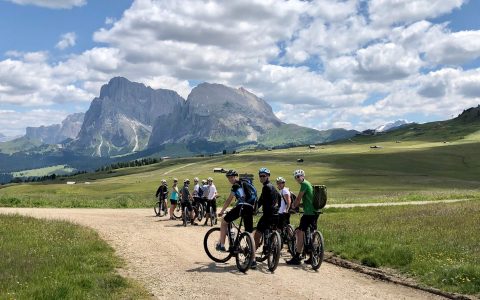Know Before You Go:
Italian Phrases

Want to sound like a local as you order that mid-morning cappuccino?
Here are a few key Italian phrases and a couple hints on pronouncing the Italian language which, once mastered, will help you parla like a true paisano.
Italian Phrases: Pronunciation
1. Pronounce every letter in the word, including the letters at the end of the word.
Example: Gr-a-zi-e
2. Master the pronunciation of vowels. They are different from vowels in English.
“A” is pronounced like ‘a’ in fAther, NOT as in hAte (e.g., pasta).
“E” is pronounced like ‘e’ in bEst, not hE (e.g., bene).
“I” is pronounced like ‘ee’ in sheep, and has to be short, not as in rIght (e.g., pizza).
“O” is pronounced like ‘o’ in pOlice, NOT as in officer (e.g., molto).
“U” is pronounced like oo in Ooze (e.g., tiramisu).
3. ”R” in Italian is always pronounced STRONGLY. Imagine the sound of children imitating an electric buzzer with the tip of their tongue (e.g., buon giorno).
4. Double consonants have to be pronounced by lingering on the first of the two consonants (e.g., MaMma).
Need more help?
Check out VOCABOLaudio.com. Use the search field to look for words and click the icon to hear it pronounced.
Vocabulary
Good morning Buon giorno (Used in the morning until just after lunch.)
Good afternoon/evening Buona sera (Italians usually start to say Buona Sera once the shops start re-opening around 3:30 p.m.)
Good night Buona notte (Used at the end of the evening, when you’re going to bed.)
Hello/goodbye (informal) Ciao (Used in informal situations, with people you know.)
Goodbye (formal) Arrivederci
Excuse me Mi scusi
I’m sorry! Mi dispiace
Please Per favore
Thank you Grazie
Thanks a lot! Grazie mille!
You’re welcome Prego
MORE FROM Italy

Reading for the Road: Books About Florence
Tuscany
New Trip Spotlight: Venice to Verona Biking
Veneto
Cuisine 102: Tuscan Delicacies
Tuscany
How to Best Experience the Natural Wonders of Umbria
Umbria
Notes from the Road: A Research Trip in Sicily
Sicily
Umbria’s 3 Essential Cities
Umbria
Sustainable Cuisine in Northern Italy: In Conversation with Michelin-starred Chef Norbert Niederkofler
Dolomites
The Origin of the Negroni: Florence’s Favourite Cocktail
Tuscany
The 10 Best Restaurants in Florence
Tuscany
Giro-E: Racing the Giro d’Italia Route on E-bikes
Italy
The Best Villas in Italy: Amalfi, Tuscany and Umbria
Amalfi Coast
A Taste of Piemonte with Silvia Altare
Piemonte
Finding Prosperity in Food & Community in Rural Italy
Puglia
5 Unmissable Tuscan Hilltop Towns
Tuscany
The Most Incredible Hikes in Italy’s Dolomite Mountains
Dolomites
The Best Hotels in Rome for Every Taste
Rome
A Day in Florence: Rediscovering the City with Family Post-Lockdown
Tuscany
The Slow Fund: Replanting Trees in the Dolomites with Wow Nature
Dolomites
Why Your Next Private Family Vacation Should Be to the Dolomites
Dolomites


